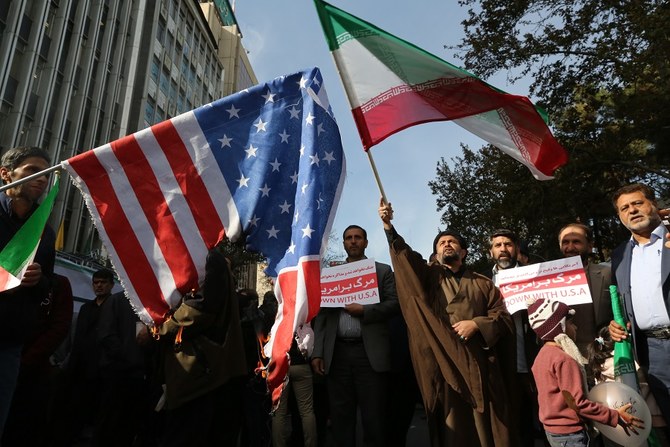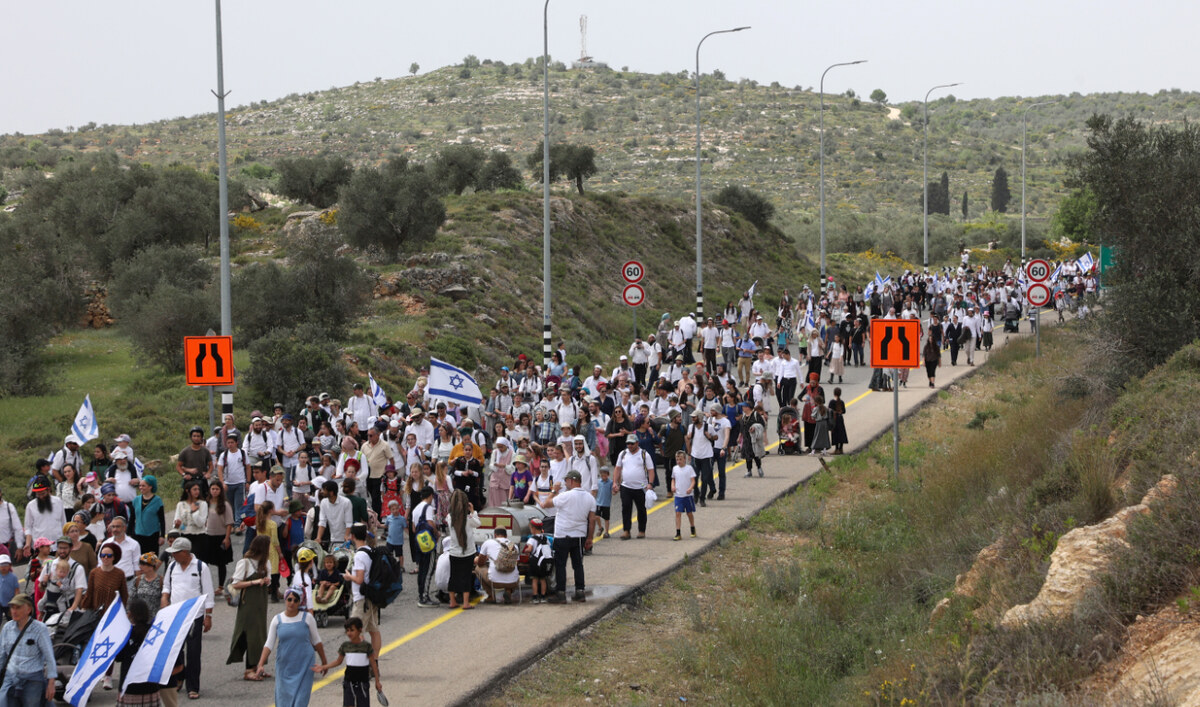DUBAI: A sudden White House announcement that a US aircraft carrier and a bomber wing would be deployed in the Arabian Gulf to counter Iran comes just days ahead of the anniversary of President Donald Trump’s decision to withdraw America from Tehran’s nuclear deal.
The bomber task force will likely include four bombers along with personnel to fly and maintain the aircraft, US officials told Reuters on Tuesday.
The officials, speaking on the condition of anonymity, said they would likely be B-52 aircraft and had not yet departed for the Middle East.
Iranian President Hassan Rouhani is said to be planning a speech Wednesday on the anniversary to discuss the next steps Tehran will take in confronting the US Officials in the Islamic Republic previously warned that Iran might increase its uranium enrichment, potentially pulling away from a deal it has sought to salvage for months.
The military has almost always had an aircraft carrier in the Arabian Gulf as part of its sprawling military presence in the strategic region, but had begun to scale back its presence as the air campaign against the Daesh group in Iraq and Syria wound down.
Sunday night’s statement from national security adviser John Bolton said the USS Abraham Lincoln, other ships in the carrier’s strike group and a bomber wing would deploy to the Mideast. Bolton blamed “a number of troubling and escalatory indications and warnings,” without elaborating.
“The United States is not seeking war with the Iranian regime, but we are fully prepared to respond to any attack, whether by proxy, the Islamic Revolutionary Guard Corps, or regular Iranian forces,” Bolton said.
In Iran, the semi-official ISNA news agency on Monday quoted an anonymous official as saying that Rouhani planned a broadcast address Wednesday and may discuss the “counteractions” Tehran will take over America’s withdrawal from the nuclear deal. It said Iranian officials have informed their European counterparts — with whom Iran has been trying to salvage the agreement — of the planned speech.
“Partial and total reduction of some of Iran’s commitments and resumption of some nuclear activities which were ceased following (the deal) are the first step,” ISNA said. Iranian state television and the semi-official Fars news agency similarly suggested an Iranian response loomed.
A spokesman for Iran’s Supreme National Security Council, Keivan Khosravi, also dismissed Bolton’s comments as “psychological warfare.”
Iran’s hard-line Javad newspaper, associated with the Revolutionary Guard, said Wednesday would “ignite the matchstick for burning the deal.” It suggested in its Tuesday edition that Iran may install advanced centrifuges at its Natanz facility and begin enrichment at its Fordo facility, activities prohibited under the nuclear deal.
The United Nations’ nuclear watchdog says Iran has continued to comply with the terms of the 2015 nuclear deal, which saw it limit its enrichment of uranium in exchange for the lifting of economic sanctions. But American sanctions have wreaked havoc on Iran’s already-anemic economy, while promised help from European partners in the deal haven’t alleviated the pain.
The US last week stopped issuing waivers for countries importing Iranian crude oil, a crucial source of cash for Iran’s government.
It’s unclear what specific threat American officials perceive coming from Iran. A US official, who spoke to The Associated Press on condition of anonymity to discuss intelligence matters, said American troops at land and sea could be targeted.
The USS Abraham Lincoln had been in the Mediterranean Sea conducting operations alongside the USS John C. Stennis, another aircraft carrier that has twice been in the Arabian Gulf in recent months.
However, American military officials have stopped the near-continuous presence of aircraft carriers in the Arabian Gulf, a pattern set following the 1991 Gulf War. American air bases spanning the region can scramble fighter jets and drones, lessening the necessity of an aircraft carrier as US officials also worry about China and Russia.
Already in the Arabian Gulf is a group of US Navy warships led by the USS Kearsarge, an amphibious assault ship carrying troops from the 22nd Marine Expeditionary Unit. The Kearsarge also carries AV-8B Harrier fighter jets, MH-60 helicopters and MV-22 Osprey airplanes.
Across the wider 5th Fleet, there were 17 warships deployed, according to the most-recent count by the US Naval Institute, which tracks deployments around the world.
The Bahrain-based 5th Fleet declined to comment on the White House announcement when reached by the AP on Monday.
It also remains unclear what bomber wing would be deployed to the region. Typically, the Al-Udeid Air Base in Qatar, home to the forward headquarters of the US military’s Central Command, hosts such bomber deployments.
In late March, the Air Force acknowledged a rare gap in bomber cover in the Mideast after a squadron of B-1 Lancers left Al-Udeid to return to Texas. B-52 bombers also had been deployed to the area to keep up attacks on the Daesh group, the first time the aging aircraft had deployed to the region in 25 years.
Officials at Al-Udeid, which also hosts the F-35 fighter jet, declined to answer questions from the AP.
The Trump administration, which abruptly announced in December that it was pulling out of Syria, still maintains 2,000 US troops in the northern part of the war-torn country. Officials suggest they serve as a check on Iranian ambitions and help ensure that Daesh fighters do not regroup. No significant US forces have so far withdrawn from Syria.
Trump has also said he has no plans to withdraw the 5,200 troops stationed in Iraq as part of a security agreement to advise, assist and support the country’s troops in the fight against Daesh. Earlier this year, Trump angered Iraqi politicians and Iranian-backed factions by saying troops should stay there to keep an eye on neighboring Iran.




































